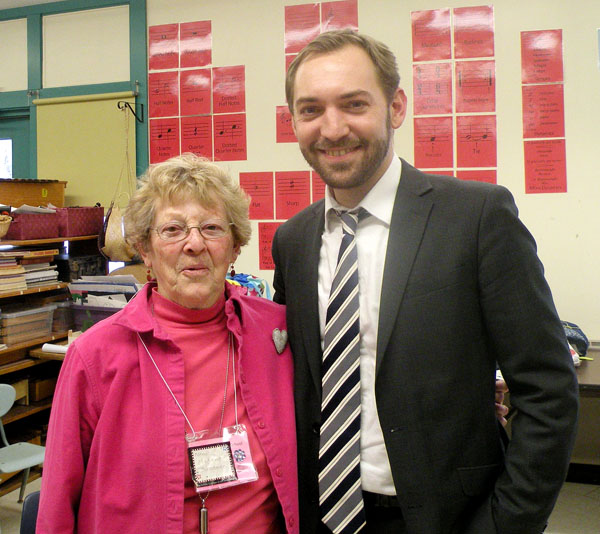Elementary school children participating in Augusta’s after-school French Heritage Language Program provided delightful entertainment to two international guests on Feb. 12, with stories and songs.
A group of about 15 local children ages 6 thru 10 years old attend biweekly classes with Margot Stiassni-Sieracki, and her teaching team of cultural associates from the University of Maine in Augusta. Their guests on Feb. 12 at the Lillian P. Hussey Elementary School in Augusta were Benoit Le Dévédec, the coordinator with the French Heritage Language Program in New York City and Anne Miller, the cultural attaché from Boston, assigned to the Consulate General of France.
Their welcome began with the children singing the French folk song, “Allouette,” led by program assistant Madame Suzanne Fournier-LeBelle Hedrick, with help from 6-year-old Tory Tibbitts. After singing, the children shared their enthusiasm for learning favorite words like “Bonjour” and “Oui.”
During the conversational segment of the program, the children were given check marks for excellence every time they correctly used a French word.
Miller explained their visit to the children’s group. “We’re here to support children who want to learn French because we see the program as a way of healing the past while preparing for the future,” she said. Her point about “healing the past” refers to a long-held but wrong-minded emphasis about speaking French with a particular “Parisian” accent.
In the Maine French Heritage Language program, the “Parisian” speaking accent is debunked. Rather, the children are exposed to numerous variants of the language, including the French common to the French-Canadians who came to the area from Canada.
“French is a universal language regardless where it is spoken,” says Miller.
Augusta City Councilor and former state legislator Patrick Paradis, officially welcomed the international guests.
Chelsea Ray, a French professor from the UMA, led a group to help create the after-school French program. She was motivated by her adult French students who took classes at the University of Maine at Augusta who wanted to connect with the language spoken at home by their parents and grandparents. These adult students said they wanted their children to learn French before the language was totally forgotten. She also took a personal interest in language learning for children when she began teaching her twin daughters when they were one and a half years old.
In fact, French was the first language of thousands of French-Canadian immigrants who migrated to Maine and settled in the Augusta and Waterville areas to find work during the 19th and up until the middle 20th centuries. They insulated their neighborhoods in communities called “Little Canadas,” where cultural, and Roman Catholic religious practices, with a strong emphasis on speaking French at home, school and in church, were protected.
In Augusta, this particular ethnic neighborhood is still called “Sand Hill,” a neat community of well-kept homes built within walking distance of St. Augustine’s Roman Catholic Church and parochial school. Paradis, 59, grew up living in Sand Hill. He fascinated the children with personal stories about growing up in Sand Hill, where he was raised speaking French at home and at school. “My father told me to be proud of my French heritage,” he said.
Enrollment in the after-school program is encouraged by parents who want their children to learn French. Several students said they asked to participate in multiple years after their first experience, says Ray. Two children, who are sister siblings, also study Mandarin Chinese at a program in Bangor, in addition to participating in the Hussey after-school program.
The purpose of the Maine French Language Heritage program is to bridge the gap between generations of French speaking families and celebrate to Franco-American heritage, says Ray. All children who want to learn French are welcome to participate.
A similar after-school program is held in Auburn, supported by the Franco-American Heritage Center in Lewiston.
Contact Chelsea Ray for more information about the Maine French Heritage Language Program at chelsea.d.ray@maine.edu or phone (207) 621-3487.
Send questions/comments to the editors.



Comments are no longer available on this story